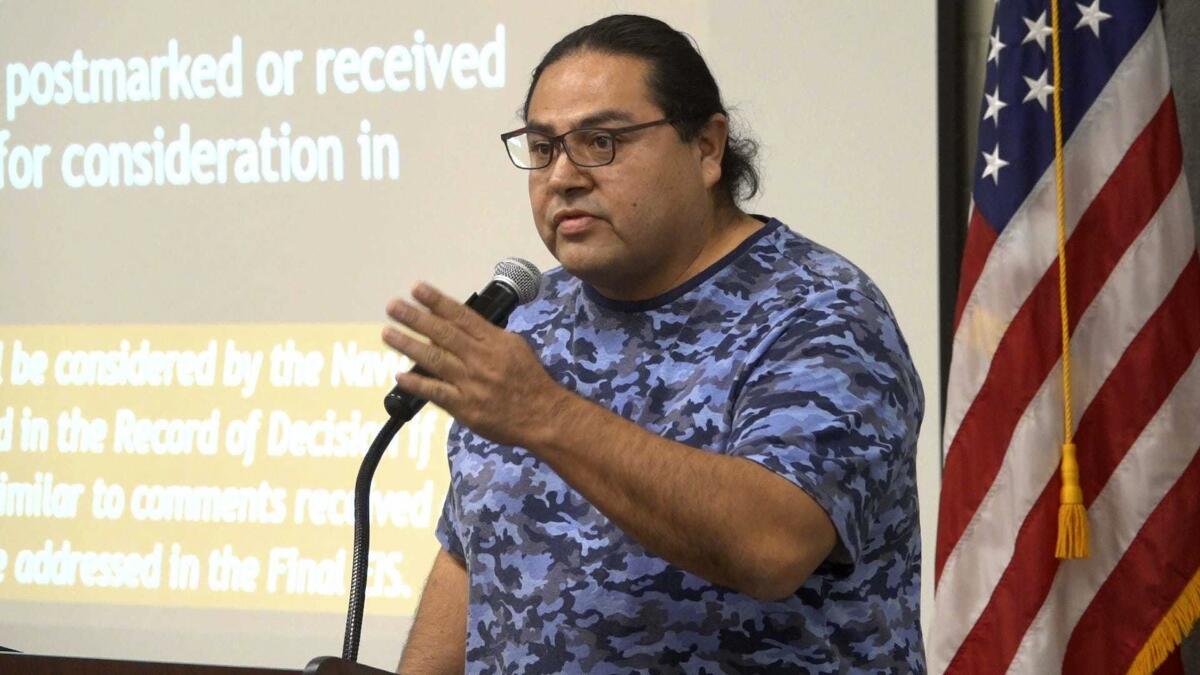Myron Dewey, filmmaker who focused on Native American fight against oil pipeline, dies at 49

- Share via
Myron Dewey, a filmmaker and journalist who helped draw worldwide attention to the concerns of Native Americans fighting an oil pipeline near the Standing Rock Sioux Reservation, has died in a car crash.
Dewey, a citizen of the Walker River Paiute Tribe, died Sunday when his car crashed in rural Nevada, the Nye County sheriff said. The 49-year-old had posted footage on Twitter a day earlier from a central Nevada military installation where he and other members of local tribes have long protested the proposed expansion of a U.S. Navy bombing range.
Dewey won acclaim for his live footage of the 2016 demonstrations over the Dakota Access Pipeline near the Standing Rock Reservation, which straddles the North Dakota-South Dakota border. His visuals of Native Americans being sprayed with water cannons in freezing weather were viewed by hundreds of thousands after appearing online and in the news.
He later co-directed the documentary “Awake: A Dream from Standing Rock,” which outlined the demonstrators’ motivations — to preserve the environment and fight for clean water.
Friends and relatives said they will remember Dewey for his commitment to advocating for Native Americans, for being a devoted friend and family member and for the authenticity of his work.
“He was able to show a perspective and viewpoint that was simply being ignored because of the systemic oppression our people have encountered as long as we’ve been here,” said Dewey’s cousin Lance West. “It was his story to tell, and only someone like him could share it in a manner that really spoke to us.”
Dewey was among a group of Native American journalists arrested during the Dakota Access Pipeline protests when he filmed employees of the company constructing the pipeline. The Morton County sheriff accused him of stalking private security workers with a drone video recorder, but prosecutors ultimately dropped the charges.
More than 400 demonstrators clashed with police on a bridge north of a protest encampment near the Standing Rock Sioux reservation in North Dakota on Sunday night.
His footage from the fight’s front lines was one episode in a long career of chronicling Indigenous and environmental issues throughout North America.
Dewey founded the media production company Digital Smoke Signals, which produced work about schools on reservation land in Nevada and about tribal land management practices in the Pacific Northwest.
In recent months, he participated in demonstrations against a proposed lithium mine near the Nevada-Oregon border and the Fort McDermitt Indian Reservation. Environmentalists and local Native Americans oppose the project, saying it would desecrate land the Northern Paiute and Western Shoshone consider sacred and have adverse environmental impacts on the region’s residents.
Dewey, who primarily resided in Schurz, Nev., on the Walker River Paiute Reservation, started his career as a wildland firefighter in Nevada. He also worked as a professor, teaching courses on film at Duke University’s Center for Documentary Studies and on digital media at Northwest Indian College in Washington state.
He is survived by his wife, Deborah Parker, and five children.
“His every breath was a fight for his people,” Parker told Indian Country Today, noting Dewey also was passionate about sharing his experiences as a Native American boarding school survivor. “He didn’t want to be silent when others wanted him to be. He didn’t want the atrocities to go unnoticed or unrecognized.”
More to Read
Start your day right
Sign up for Essential California for the L.A. Times biggest news, features and recommendations in your inbox six days a week.
You may occasionally receive promotional content from the Los Angeles Times.






